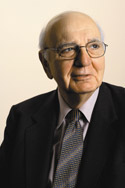Thirteenth Annual International Banking Conference

In conjunction with the International Monetary Fund, the Federal Reserve Bank of Chicago held its thirteenth annual International Banking Conference on September 23–24, 2010. The purpose of the conferences was to address current issues affecting international financial markets. The conference examined the role of macroprudential regulation in the financial sector. Shocked by the experience of the last few years, many argue that the more traditional microprudential regulatory tools are inadequate to create a safe and stable financial system. The microprudential paradigm relies on the presumption that the financial system as a whole can be made safe by ensuring individual financial institutions are made safe. This ignores interconnections and externalities, whereby the actions of one financial institution or events in financial markets can lead to spillover effects that adversely affect general market conditions, other financial institutions, and ultimately the economy as a whole. Instead, it is argued, there is a need for both microprudential approaches to regulate individual institutions and macroprudential approaches to manage the overall financial system risks. However, a number of important questions must be answered:
- What are the theoretical motivations for such regulation?
- How would it interact with other regulatory and macroeconomic policies, especially monetary policy?
- What would be the specific macroprudential tools?
- Who should have control over the macroprudential tools?
- How should a macroprudential regulator be structured?
- Where should it be housed?
- How can macroprudential policies be structured across national borders?
- What role, if any, can market discipline play in supporting macroprudential objectives?
These and related issues will be addressed at the two-day conference.
As always, the conference will focus on the implications for public policy. It will feature keynote presentations by Paul Volcker, Chairman of the U.S. President’s Economic Recovery Advisory Board and former Chairman of the Federal Reserve System; Tommaso Padoa-Schioppa, Chairman, Promontory Financial Group Europe and Former Chairman of the Basel Committee on Banking Supervision; Jaime Caruana, General Manager of the Bank for International Settlements and Former Chairman of the Basel Committee on Banking Supervision; and Charles Taylor, Director of the Pew Charitable Trust Financial Reform Project and Former Executive Director of the Group of Thirty. The makeup of the conference is truly international. The audience consists of representatives from central banks, regulatory and supervisory agencies, financial institutions, trade associations and academic institutions from around the globe. Last year, attendees came from some 30 countries.
Featured Speakers

In the course of his career, Paul A. Volcker worked in the United States federal government for almost 30 years, culminating in two terms as chairman of the Board of Governors of the Federal Reserve System from 1979-1987. He divided the earlier stages of his career between the Federal Reserve Bank of New York, the Treasury Department and the Chase Manhattan Bank.
Volcker retired as chairman of Wolfensohn & Co. upon the merger of that firm with Bankers Trust. From 1996-1999, Volcker headed a committee formed to determine existing dormant accounts and other assets in Swiss banks of victims of Nazi persecution. From 2000–05, Volcker served as chairman of the Board of Trustees of the International Accounting Standards Committee overseeing a renewed effort to develop consistent, high-quality accounting standards acceptable in all countries. In 2003, he headed a private Commission on the Public Service recommending a sweeping overhaul of the organization and personnel practices of the United States federal government.
In April 2004, Volcker was asked by UN Secretary General Kofi Annan to chair the Independent Inquiry into the United Nations Oil-for-Food Program. The report on the inquiry was published in October 2005. In 2007, Volcker was asked by the president of the World Bank to chair a panel of experts to review the operations of the Department of Institutional Integrity. A report was published in September 2007. In November 2008, President Elect Obama chose Volcker to head the President’s Economic Recovery Advisory Board.
Pursuing his many continuing interests in public policy, Volcker is associated with the Japan Society, the Institute of International Economics, the American Assembly, and the American Council on Germany. He is honorary chairman of the Trilateral Commission and chairman of the Trustees of the Group of 30.
Tommaso Padoa-Schioppa is chairman of Promontory Financial Group Italy S.a.r.l. He served as senior adviser to the founder and chief executive officer of Promontory Financial Group, LLC from January 2006 until May of that year, when he was selected as Minister of the Economy and Finance in the Italian government and chairman of the International Monetary and Financial Committee of the International Monetary Fund. He was appointed to his new position to lead Promontory’s expansion of operations in Europe in May 2009.
Padoa-Schioppa is chairman of the Trustees of the International Accounting Standards Committee Foundation (IASC), the independent body responsible for development and promulgation of global accounting standards. He is also president of Notre Europe, a European think tank based in Paris, and is widely recognized as the intellectual impetus behind the creation of the euro.
From 1993 to 1997, Padoa-Schioppa was chairman of the Basel Committee on Bank Supervision, where he led the work to extend capital requirements for market risks and to elaborate and adopt the Core Principles on Banking Supervision, which are now applied worldwide. Padoa-Schioppa was a member of the European Central Bank's six-member Executive Board from its founding in 1998 until 2005; chairman of the Commissione Nazionale per le Società e la Borsa (CONSOB) Italy’s securities regulator (1997-98); deputy director general of the Banca d'Italia (1984-97); and director-general for Economic and Financial Affairs at the Commission of European Communities (1979-83).
He served as Chairman of the G-10 Committee on Payments and Settlement Systems from 2000 to 2005, where the committee assumed a key new role as a standard-setting body under his leadership. In particular, it adopted the 2001 Core Principles for Systemically Important Payment Systems, the 2001 Recommendations for Securities Settlement Systems and the 2004 Recommendations for Central Counterparties. He began his financial services career in 1968 at the Bank of Italy.
He is the author of, “The Road to Monetary Union in Europe,” (2000), “The Euro and Its Central Bank: Getting United after the Union” (2004), “Regulating Finance,” (2004), and other books, essays and articles. He graduated from Bocconi University, Milan, and the Massachusetts Institute of Technology.
Jaime Caruana took up the position of General Manager of the Bank for International Settlements on April 1, 2009. As the Bank's chief executive officer, he carries out the policy determined by the Board of Directors and is responsible to the Board for the management of the Bank.
Previously, Caruana was financial counsellor to the managing director as well as director of the Monetary and Capital Markets Department at the International Monetary Fund. From 2000 to 2006, Caruana was the Governor of the Bank of Spain, Spain's central bank, and in that capacity, served on the Governing Council of the European Central Bank. He was also the chairman of the Basel Committee on Banking Supervision from 2003 to 2006 and has been a member of the Financial Stability Forum (now the Financial Stability Board) since 2003. From 2004 to 2006, he chaired the Coordination Group, a senior group of supervisory standard setters from the Basel Committee, the International Organization of Securities Commissions (IOSCO), the International Association of Insurance Supervisors (IAIS) and the Joint Forum.
Prior to joining the Bank of Spain, Caruana served as director general of the Spanish Treasury and headed an investment services company and a fund management company for nearly 10 years.
Charles Taylor is director of the Financial Reform Project at the Pew Charitable Trusts and a fellow at the Financial Institutions Center at the Wharton School of the University of Pennsylvania.
From 2002 to 2008, Taylor was director, operational risk at the Risk Management Association and a member of the Association’s leadership team. Before 2002, he was managing director strategy development at the Depository Trust & Clearing Corporation in New York and immediately prior to that, head of the global risk management practice at Andersen Consulting. As executive director of the Group of Thirty in the first half of the 1990s, he had authored several studies, spoken and published widely and advised government and industry on issues of public policy and private practice.
Taylor started his career at the World Bank in 1973. He has degrees from Oxford and Cambridge in economics and mathematics and from the University of Pennsylvania in business.
Last Updated: 10/12/2010










